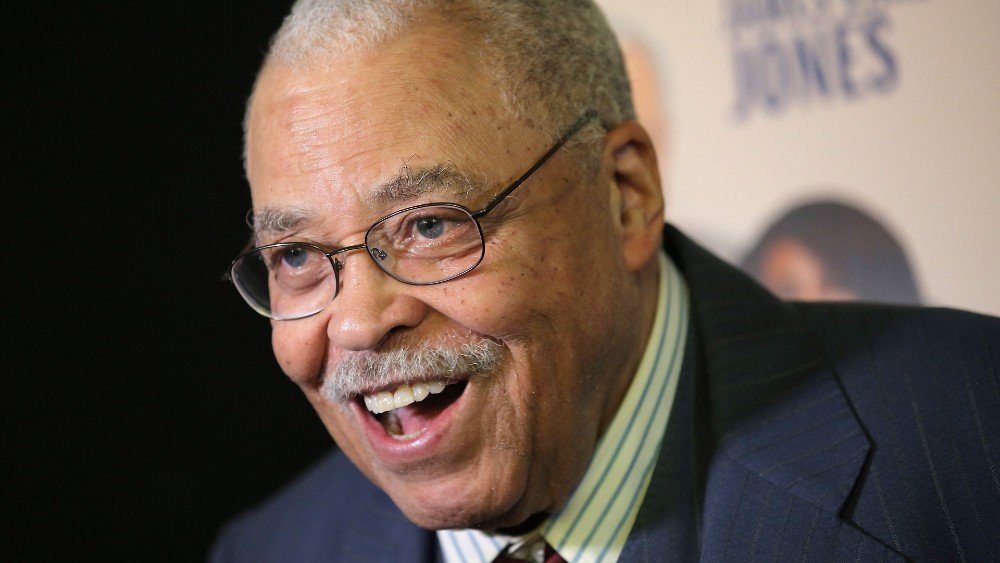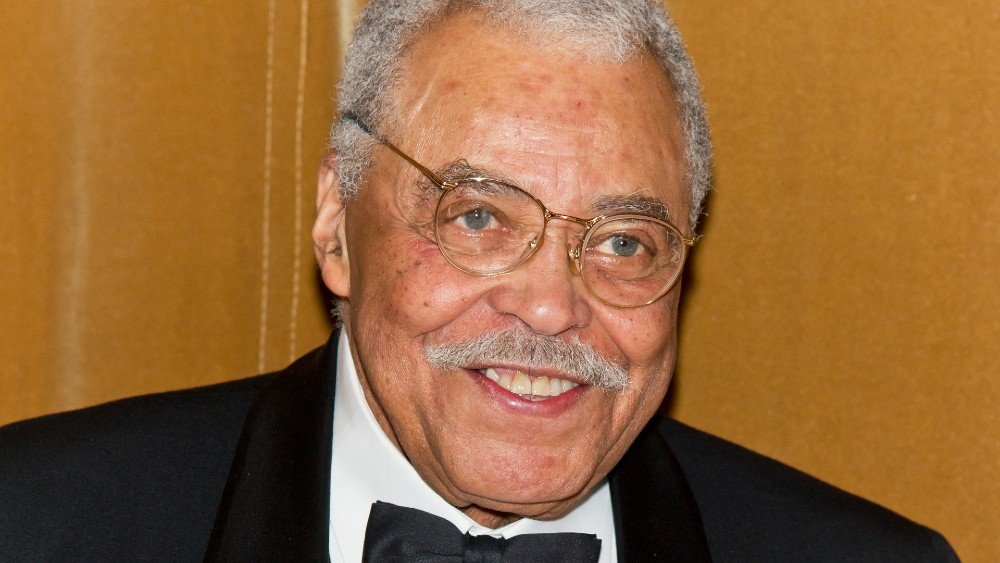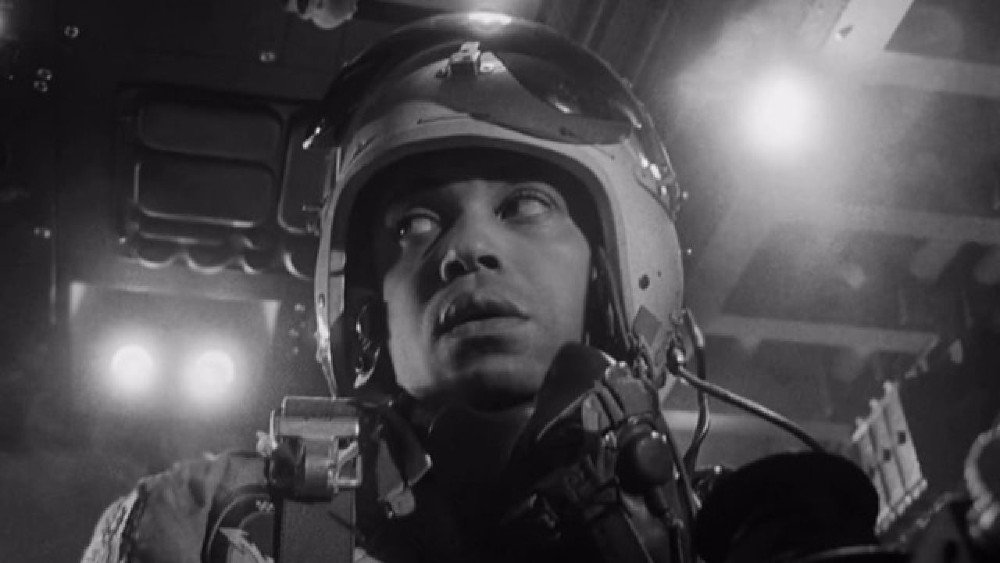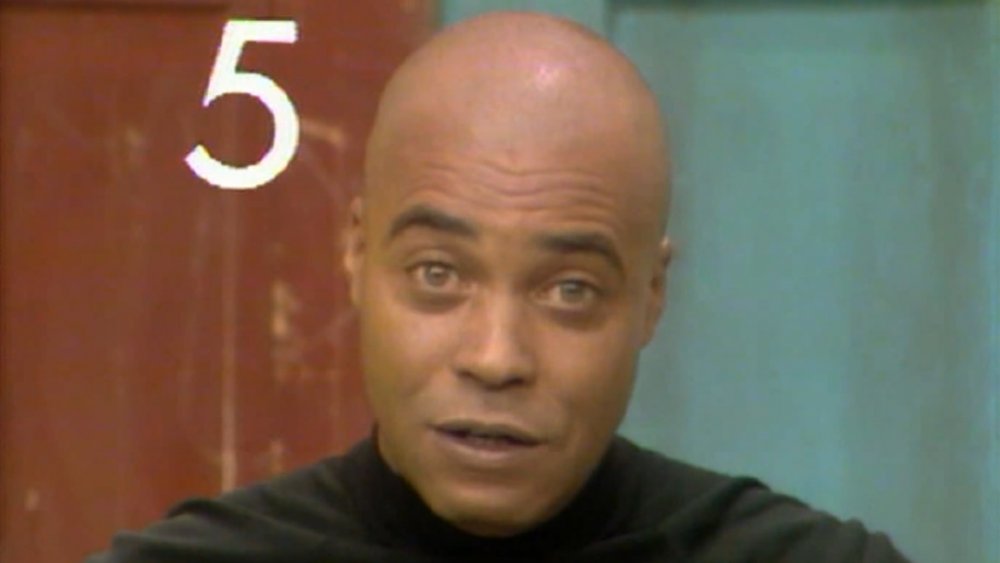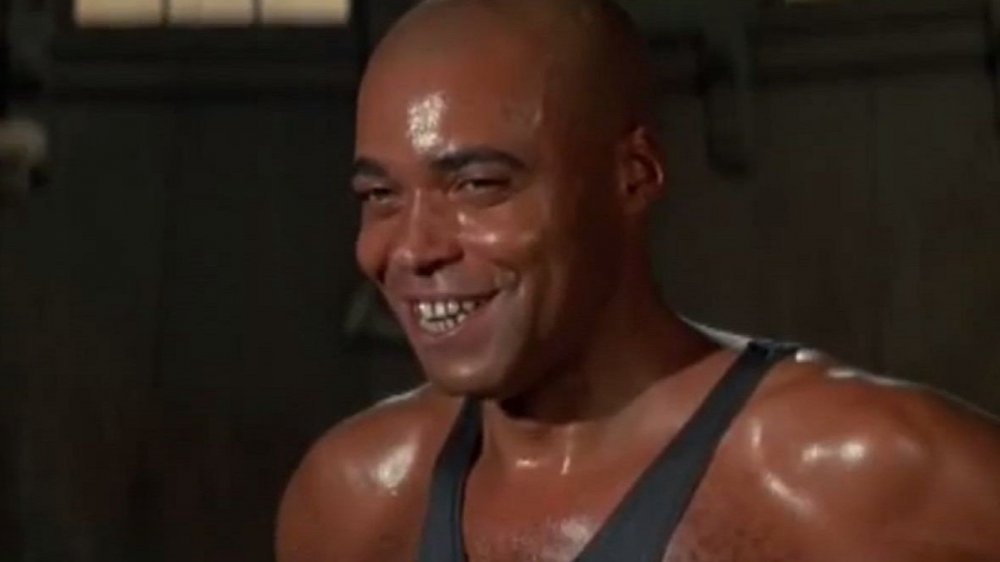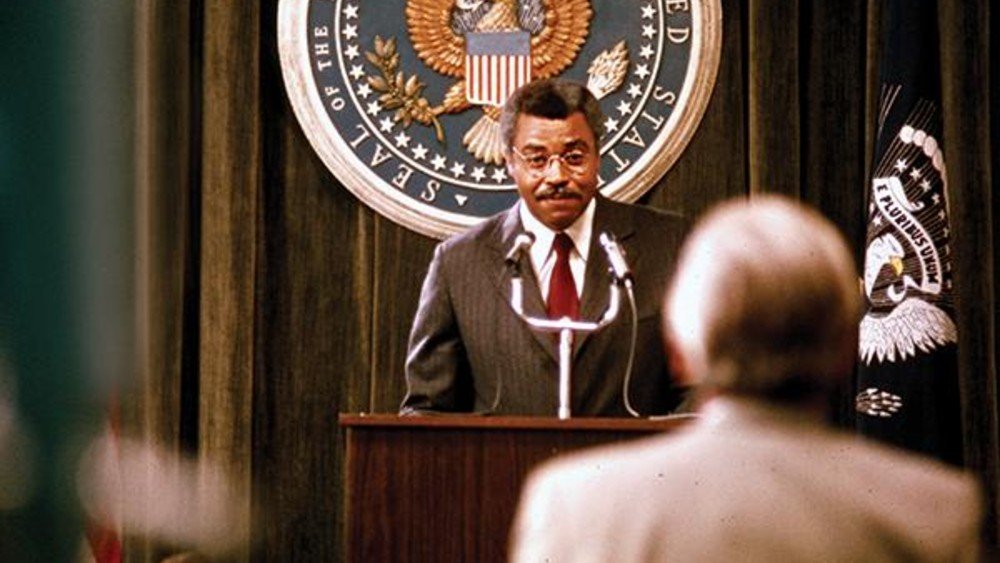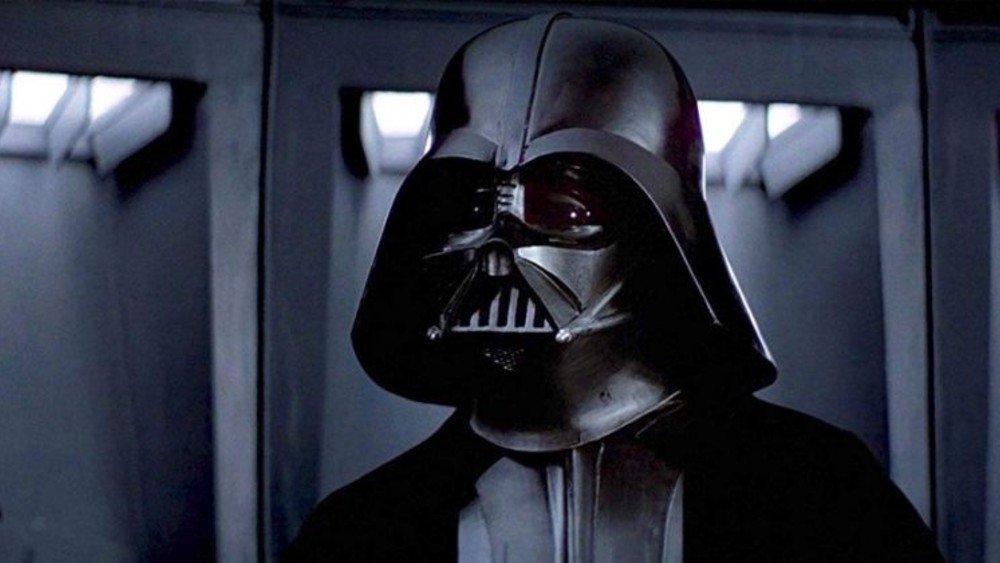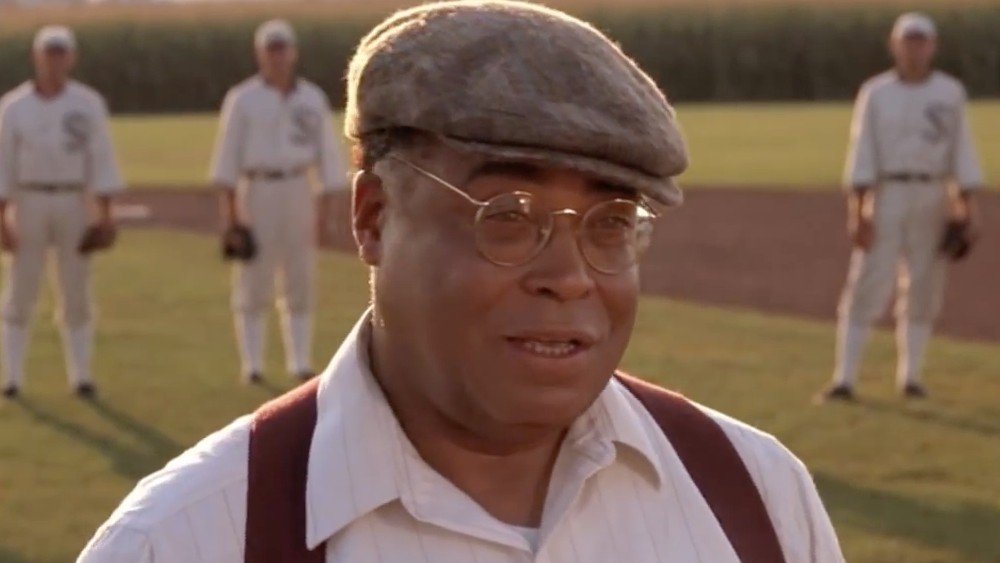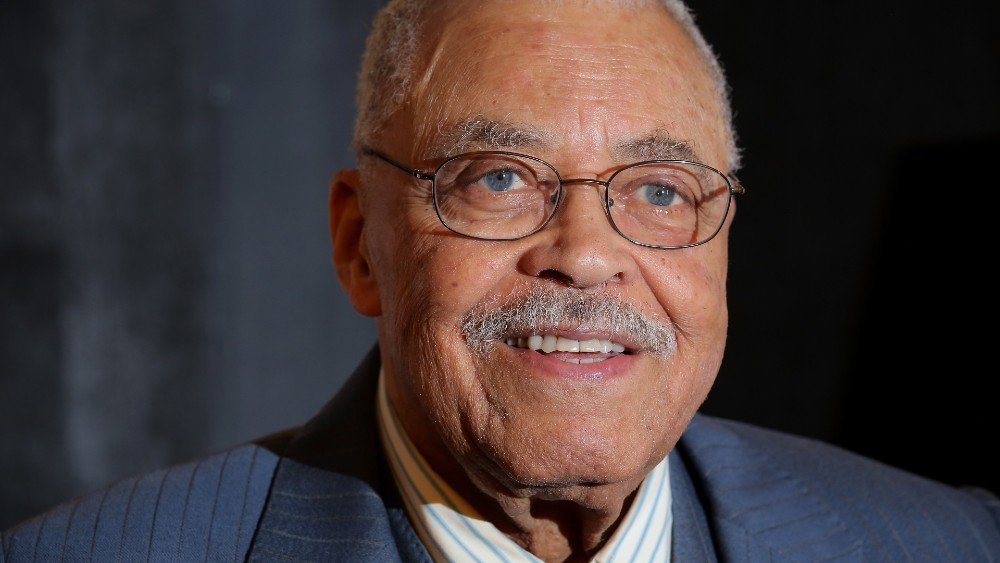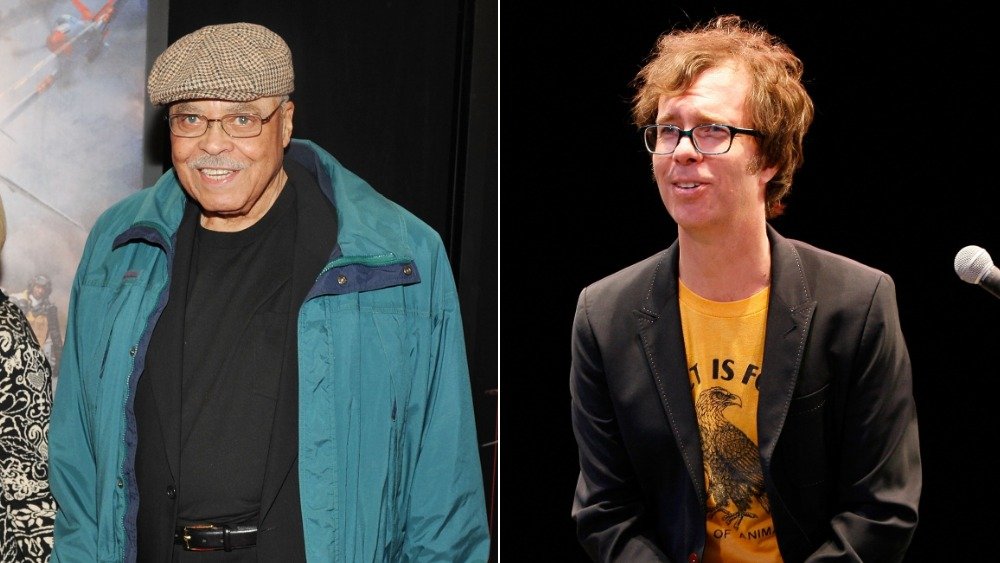What James Earl Jones Fans Don't Know About The Legend
Few Americans actors boast careers as lengthy and storied as that of James Earl Jones, a man whose career in television and film spans the better part of a century. He's an Academy and Emmy Award winner and a pioneer in tearing down racial barriers in Hollywood. He's played boxers, presidents, spymasters, and kings. He has the rare distinction of having not only one of America's most famous faces but one of its most recognizable voices. If you haven't heard him as the doomed Mufasa in both the 1994 and 2019 versions of The Lion King, then odds are pretty good that he's terrified you as the Sith Lord Darth Vader in the Star Wars films.
But whether you know him better as Luke Skywalker's tragic father, as the king of Zamunda in Coming to America, or as the solitary writer in Field of Dreams, there's a lot you probably don't know about Jones. The actor faced unique hurdles as a young man, helping to not only form that unforgettable voice of his but to overcome all the other challenges necessary to build such a legendary career. From his early origins to the modern day, here's what even the biggest James Earl Jones fans don't know about the legend.
James Earl Jones' voice developed through adversity
If you hear James Earl Jones' voice, you know it's him. Along with voicing iconic roles like Darth Vader and Mufasa, he's given his unforgettable voice to commercials, animated TV shows, audio books, video games, and news networks.
So, you may be surprised that the man behind such a singular voice refused to use it for much of his childhood. When he was five years old, Jones was moved from his home in Mississippi to Michigan to be raised by his maternal grandparents. In a 1996 interview, Jones said being torn away from his home was so traumatic that he developed a stutter. He called the year of his move his "first mute year." Until his high school years, Jones endeavored to use his voice as little as possible. "It wasn't that I stopped talking," Jones said, "it's that I resolved that talking was too difficult."
The end to Jones' silence came with an insightful teacher. In high school, Jones began writing poetry, and his English teacher took note of this. The teacher told Jones his poem "Ode to Grapefruit" was so good that he didn't believe Jones had written it. He said the only way he'd believe Jones is if the future actor stood in front of the class and read it out loud. The young Jones accepted the challenge and was surprised to read it from start to finish without stuttering.
Stanley Kubrick wanted him for Dr. Strangelove
By the early '60s, James Earl Jones had been working professionally in TV for a decade, but he only had a handful of one-offs under his belt. His first TV credit came in 1952 with an appearance on the soap opera Guiding Light, and he had similar brief appearances on shows like As the World Turns and the courtroom drama The Defenders. That changed when he was cast in his first film — the 1964 classic Cold War satire Dr. Strangelove or: How I Learned to Stop Worrying and Love the Bomb.
As for the plot of Dr. Strangelove, a rogue general launches a nuclear strike on Russia. After the generals and politicians manage to issue orders recalling almost all of the B-52 bombers, a single plane defies all odds to keep pushing forward to make its bombing run, not knowing their attack will mean the end of the world. Jones plays Lt. Lothar Zogg, a member of the crew on the B-52 that helps usher in doomsday.
In an interview on The Dick Cavett Show, Jones said director Stanley Kubrick already knew he wanted George C. Scott to play the war hawk General "Buck" Turgidson in his film, but Kubrick went to New York City anyway to watch Scott play Shylock in a Shakespeare in the Park production of The Merchant of Venice. Jones happened to be in the same production, playing the Prince of Morocco, and Kubrick — mindful of wanting an ethnically diverse cast — took note of Jones.
James Earl Jones helped us learn to count
By 1969, James Earl Jones was no stranger to either the movie or TV screens. Along with his film debut in Dr. Strangelove, he scored a supporting role in the 1967 political drama The Comedians. At the same time, he continued to work regularly on TV, earning more prominent roles in shows like Tarzan and the medical drama Dr. Kildare. So it's pretty likely that more than a few parents recognized the man who showed up on the new children's television series, Sesame Street.
Of the many firsts in Jones' career, he's often credited as being the first celebrity guest to show up on Sesame Street. Jones was invited to appear on the new series in 1969, where the younger and stylishly bald actor read the alphabet and counted slowly to ten before dropping to the floor. In a 2008 interview, Jones mentioned his Sesame Street appearance, including a suggestion he made that was thankfully ignored. Jones said he warned Matt Robinson, who played Gordon on Sesame Street, "This Muppet business has got to go, kids will be terrified." Clearly, Jones is a better actor than he is a fortune teller.
He was an Academy Awards trailblazer
In 1970, James Earl Jones became only the second Black man to be nominated for an Academy Award for Best Actor (Sidney Poitier was the first to be nominated in 1963 for Lilies of the Field). While Jones didn't win the award, it's particularly impressive when you consider it was for his very first leading film role, as boxer Jack Jefferson in The Great White Hope. Interestingly, Jones won a Tony Award for his portrayal of Jefferson in the 1968 stage production of The Great White Hope, so it was natural to tap him for the film adaptation. He was also rejoined by Jane Alexander as Eleanor Bachman, who played Jefferson's love interest.
Inspired by the story of the real-life prizefighter Jack Johnson, the hero of The Great White Hope is a Black boxer who angers racists as he continues to knock out every white boxer he fights. The same bigots see an opportunity to humiliate Jefferson when word spreads that he's spending lots of time with the aforementioned Eleanor, a white woman. Jefferson is given an awful set of choices by his enemies, and things don't end well for either the boxer or Eleanor. Of course, while it's a tragic tale, it's also a testament to Jones' power and skill as an actor.
On the big screen, James Earl Jones made presidential history
Over 35 years before Barack Obama made history by becoming the first Black president of the United States of America, James Earl Jones became the first man to play a Black American president in a feature film with 1972's The Man. Based on the 1964 novel of the same name, The Man tells the story of Douglass Dilman, a Black senator who shoots up the line of succession when the president and House speaker both die in an accident and the vice president is too sick to take office.
Dilman is a president who can't seem to make anyone happy. After being catapulted into the spotlight, Dilman quickly realizes he's in risk of becoming a puppet. Secretary of State Arthur Eaton (William Windom) sees Dilman's presidency as an opportunity to be the proverbial power behind the throne, and he works both to control Dilman and to cut his ties to power. While Eaton and extremists on the right work against Dilman, he eventually loses plenty of support on the left as well. Dilman initially gives political asylum to a man who swears he's wrongly accused of attempting to assassinate a South African defense minister, and Dilman's left-leaning supporters — including members of his own family — threaten to turn their backs on him when he learns the asylum-seeker lied and extradites him to his homeland.
The film ends with Dilman sticking to his convictions and taking the stage at his party's convention in hopes of being nominated for another term. But while The Man has largely been forgotten by moviegoers, it's nevertheless a landmark in the history of film, all thanks to the talented and presidential Jones.
Originally, he didn't care if you knew he was in Star Wars
Unless you've been hiding in a hut on Dagobah, then you know that while it was David Prowse who physically played Darth Vader in the first three Star Wars films, it was James Earl Jones who gave us Vader's unforgettable voice. But believe it or not, Jones originally wasn't credited as the voice of Vader at first ... and the lack of credit was his idea.
According to Jones, he chose to keep his name out of the credits because of a controversy. Four years before the premiere of Star Wars, Mercedes McCambridge helped provide the demonic voice of the possessed Regan in The Exorcist, but she complained that she wasn't given a credit for her work. Jones said he'd initially sided against McCambridge because "she was just special effects," and that he felt the same way about his own performance in Star Wars. But by the third film, Jones' mind had changed, so he finally received a Darth Vader credit for 1983's Return of the Jedi.
Jones, by the way, would later admit he didn't exactly have a Jedi's future-seeing powers when it came to Star Wars. He told The Hollywood Reporter that he actually didn't think Vader was Luke Skywalker's father. "When I first saw the dialogue that said, 'Luke, I am your father,' I said to myself, 'He's lying. I wonder how they are going to play that lie out?'"
At first, he almost didn't build it
One of James Earl Jones' most memorable film moments comes in 1989's Field of Dreams. The film's hero is Ray (Kevin Costner), a man who receives an inexplicable vision of a baseball diamond built in the middle of his cornfield. And Jones plays Terence Mann, a radical author whose books Ray read when he was younger and of whom both Ray and his wife, Annie (Amy Madigan), have dreams. Mann wants nothing to do with Ray at first, and Ray kidnaps him, pretending he has a gun, but eventually the writer comes to believe in the miracle of the baseball field and the friendly ghosts emerging from the corn.
Mann then delivers a powerful speech toward the end of the film, telling Ray, "America has rolled by like an army of steamrollers. But baseball has marked the time. This field, this game, is a part of our past, Ray. It reminds us of all that once was good, and that could be again." It was powerful enough that sports commentator Vin Scully recited the speech to mark a North American tour of the National Baseball Hall of Fame in 2016.
And it almost didn't happen.
On the 25th anniversary of Field of Dreams, Jones admitted to The Hollywood Reporter that he had some serious concerns about the film and that it was ultimately his late wife, Cecilia Hart, who convinced him to take the role. Fittingly, Hart proved just as bad at predicting the future as her husband when she warned him that his monologue would never make it into the final cut of the film.
James Earl Jones is on a very short list when it comes to TV history
While he's probably best known for his films, James Earl Jones has done plenty of work in television, and in 1991, he achieved something exceptionally rare. That year, Jones won two Primetime Emmy Awards, both for acting. He won Outstanding Actor in a Drama Series for ABC's crime series Gabriel's Fire and Outstanding Supporting Actor in a Miniseries for the TNT movie Heat Wave.
In Gabriel's Fire, Jones plays a former police officer named Gabriel Bird who was wrongly imprisoned for murder. In 1969, Bird shot and killed a fellow officer, but he was convicted of murder when, in fact, he was defending the lives of innocent civilians the other officer was going to kill. Once he's freed from prison, Bird works as a private detective, including for the lawyer who represented him when he was released.
As for TNT's Heat Wave, it's the depiction of the 1965 Watts Riots through the eyes of Robert Richardson (Blair Underwood), a reporter covering the historic event. Jones plays the supporting role of Junius Johnson, the philosophical owner of a shoe repair shop. And thanks to these two TV roles, Jones just cemented himself further as an acting powerhouse, regardless of the medium.
He helped inspire a Ben Folds song
In 1999, the alternative rock trio Ben Folds Five released their third studio album, The Unauthorized Biography of Reinhold Messner. The final track is the sweet "Lullabye," and the song begins and ends with, "Good night, good night/Sweet baby/The world has more for you/Than it seems/Good night, good night/Let the moonlight take the lid/Off your dreams." The narrator is a young boy boarding a small plane with his uncle in the middle of the night, and he later tells us that the man singing him this touching refrain in "deep, rich tones" is James Earl Jones himself.
Apparently, the song is based on a slice of real life. At a 2010 concert in Deer Valley, Utah, before playing "Lullabye," singer Ben Folds allegedly told the audience that the song's story was inspired by a friend who — like the narrator of "Lullabye" — as a young boy shared space in a small plane with James Earl Jones. We don't know if Jones actually sang any children to sleep on the flight, though if he did, you'd think Folds would've thought to include his name in the song's credits.
